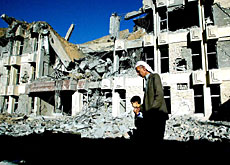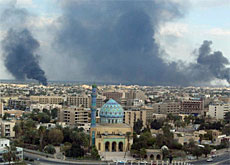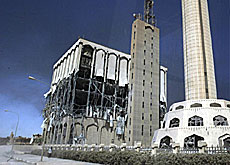Swiss repeat backing for UN role in Iraq

The Swiss economics minister, Joseph Deiss, has repeated calls for the United Nations to be given the leading role in rebuilding Iraq.
His comments came at the spring meetings of the International Monetary Fund and World Bank in Washington at the weekend.
“Switzerland thinks that the reconstruction of Iraq should happen within the framework of the UN institutions,” Deiss told swissinfo.
Along with the French finance minister, Francis Mer, Deiss reminded the IMF and the World Bank – whose mission is to support economic development in poor countries – of “the necessity of not forgetting the other nations that do not need a war to find themselves in a situation as difficult as Iraq”.
Olive branch
During the meeting, the United States presented an olive branch to other members of the G-7 industrialised nations and Russia by accepting a multilateral approach in rebuilding Iraq, starting with a new Security Council resolution at the UN.
The Swiss delegation estimates nonetheless that it would likely take four to six months before the World Bank and IMF can send a fact-finding mission in Iraq.
Meanwhile, discussions were held about the possible use of Saddam Hussein’s assets, which are thought to have been deposited in several countries.
For its part, Switzerland has frozen assets belonging to the former Iraqi president, both in 1990 after the invasion of Kuwait, and last week.
The Swiss delegation, headed by Deiss and the head of the Swiss National Bank, Jean-Pierre Roth, held talks on the topic with US officials at the State Department and the Treasury department.
Saddam’s assets
The Swiss described the talks as “positive and constructive” and said that Switzerland and the US agreed that the UN should handle the distribution of the regime’s assets – which have been frozen in Switzerland – for the benefit of the Iraqi people.
“The assets that were frozen under resolutions 661 and 670 can only be unfrozen on the basis of a new UN resolution,” a member of the delegation involved in the talks told swissinfo.
In any case, the war in Iraq has so far not resulted in the negative consequences that were expected before the conflict began.
The war’s limited impact on the world economy was also the focus of discussions. Jean-Pierre Roth told swissinfo that “the risk of having the IMF world economic outlook revised downward again is less than it was two weeks ago.”
Uncertainty
“The war is nearing its end and the rise in oil prices has not materialised, and that removes some uncertainty,” he said.
The IMF’s forecasts that the Swiss economy will see growth of just 0.3 per cent this year. But it is far more upbeat about 2004, predicting the economy will expand by 2.4 per cent.
Roth said “growth will depend on the evolution of the international economy in the second semester, but we expect that Switzerland will benefit from [improvements] in the global economy.”
The head of the Central Bank is “optimistic because our exports [are] competitive, and if a rebound occurs at the international level, there will be a rebound in investment, which is good for the Swiss economy”.
Protected sectors
Roth said he was in favour of reforming what the IMF calls the “protected sectors” of the Swiss economy, such as cartels, agriculture and telecommunications. Such reforms have been urged by the IMF for years.
“We call for this reform very strongly,” Roth told swissinfo. “When people say Switzerland is expensive, they blame the Swiss franc but the real reason is rather a situation of high costs and high prices.
“We have everything to gain in having a domestic market that is more open to competition.”
swissinfo, Marie-Christine Bozom in Washington
The Swiss economics minister has reiterated demands that the UN should oversee the reconstruction of Iraq during a meeting of the IMF and the World Bank.
The United States has proposed a new, multilateral approach to rebuilding Iraq, aimed at defusing tensions with G7 nations and Russia.
Swiss National Bank head Jean-Pierre Roth says the end of the Iraq conflict means it will have less impact on the world economy than expected.
He expects Switzerland to benefit from improvements in the global economy.

In compliance with the JTI standards
More: SWI swissinfo.ch certified by the Journalism Trust Initiative



You can find an overview of ongoing debates with our journalists here. Please join us!
If you want to start a conversation about a topic raised in this article or want to report factual errors, email us at english@swissinfo.ch.